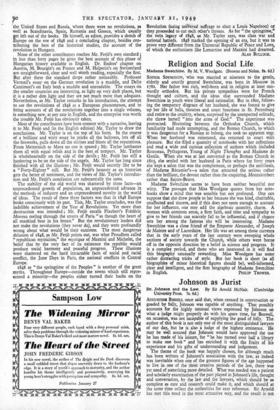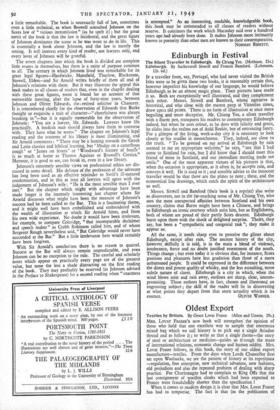Johnson as Jurist AUGUSTINE BIRREU, once said that, when crossed
in conversation or goaded by folly, Johnson was capable of anything. That possibly accounts for the highly unusual views expressed by Johnson on what a judge might properly do with his spare time, for Boswell, on occasion, was not incapable of supplying the goad of folly. The author of this book is not only one of the most distinguished lawyers of our day, but he is also a judge of the highest eminence. He may be well assured that Johnson would have approved the use he has made of his leisure, for " he has turned over half a library to make one book " and has enriched it with the fruits of his experience and his gifts of understanding and judgement.
The theme of the book was happily chosen, for although much has been written of Johnson's association with the law, as indeed was inevitable when one of the greatest figures of the age happened to live in one of the most creative periods of the law, there was yet need of something more detailed. What was needed was a patient and scholarly examination of the part played in Johnson's life, thought and conversation, by the law and the lawyers, which should be as complete as care and research could make it, and which should at the same time collect the authorities for easy reference. Sir Arnold has met this need in the most attractive way, and the result is not
a little remarkable. The book is necessarily full of law, sometimes even a little technical,. as when Boswell consulted Johnson on the Scots law of " vicious intromission" (as he spelt it) ; but the great merit of the book is that the law is incidental, and the great figure of Johnson dominates the scene as he was wont to do in life. This is essentially a book about Johnson, and the law is merely the setting. It will interest every kind of reader, not lawyers only, and every lover of Johnson will be grateful.
The seven chapters into which the book is divided are complete little essays in themselves, but there is a unity of purpose common to all. The century in which Johnson lived was remarkable for its great legal figures—Hardwicke, Mansfield, Thurlow, Blackstone, Stowell, Eldon—and Sir Arnold writes briefly of them all and of Johnson's relations with them. But it may illustrate the appeal this book makes to all classes of readers that, even in the chapter dealing with these great figures, room is found for an account of that memorable meeting, after the lapse of forty-nine years, between Johnson and Oliver Edwards, the• retired solicitor in Chancery. It is remembered chiefly for the observation of Edwards that Burke thought so exquisite a trait of character—" cheerfulness was always breaking in "—but it is equally memorable for the observation of Johnson: " You are a lawyer, Mr.. Edwards. Lawyers know life practically. A bookish man should always have them to converse with. They have what he wants." The chapter on Johnson's legal reading and the contents of his library is most illuminating, and Sir Arnold comments : " There may be a leaning towards the Greek and Latin classics and biblical learning, but ' Mudge on a catarrhous cough' or ' James on fevers' or Woodward's history of fossils' is as much at home as Thomas Aquinas or Boswell's Corsica." Humour, it is good to see, can break in, even in a law library.
Johnson's extremely sensible views on professional ethics are dis- cussed in some detail. His defence of the profession of the advocate has long been used as an effective rejoinder to Swift's ill-natured condemnation, and in this at least all lawyers will agree with the judgement of Johnson's wife: " He is the most sensible man I ever met." But the chapter which might with advantage have been made longer is the intensely interesting last chapter where Sir Arnold discusses what might have been the measure of Johnson's success had he been called to the Bar. This is a fascinating theme, and it might well have been embellished and embroidered with the wealth of illustration at which Sir Arnold hints, and from his own wide experience. No doubt it would have been irrelevant, for example, to compare Coleridge, that incomparable declaimer and speech maker " as Crabb Robinson called him, and of whom Sergeant Rough nevertheless said, "But Coleridge would never have succeeded at the Bar." But a little irrelevance here would certainly have been forgiven.
With Sir Arnold's conclusions there is no reason to quarrel. Success at the Bar will always remain unpredictable, and even Johnson can be no exception to the rule. The careful and scholarly notes which appear on practically every page are of the greatest value, but none the less a shade distracting on the first reading of the book. They may profitably be reserved (as Johnson advised in the Preface to Shakespeare) for a second reading when "exactness
is attempted." As an interesting, readable, knowledgeable book, this . book may be commended to all classes of readers without reserve. It continues the work which Macaulay said over a hundred years ago had already been done. It makes Johnson more intimately known to posterity than other men are known to their contemporaries.
NORMAN BIR10ETT.







































 Previous page
Previous page